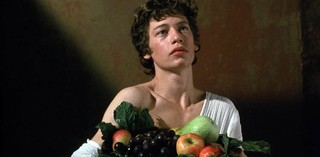Caravaggio 1986 M

When
10.30 am, Sat 19 Jun 2021 (93 mins)Where
Gallery of Modern Art & Cinema A
About
The idea for a biopic of 17th century Italian artist Michelangelo da Caravaggio (1573-1610) was suggested to Derek Jarman in 1978 by art dealer Nicholas Ward-Jackson. Notorious for his love of street fights, Caravaggio died tragically, ten years after coming to prominence in Rome where his work was celebrated for its naturalism and evocation of divine light. Knowing little about the painter, but seeing Caravaggio's rebellious nature as a metaphor for the contemporary artist, Jarman spent time in Rome researching and developing various interpretations of Caravaggio’s life, works and creative process. The project took seven years to be realised with seventeen different versions of the script drafted. Jarman's final version sought to demystify the idea of Caravaggio as a hero and instead present him as a complicated figure, full of doubts. Jarman, who spent a lot of his childhood in Italy, called on vivid memories of the Mediterranean for the smells, textures and light he wanted to evoke in the film.
For Jarman, Caravaggio’s work held within it "a complete reinterpretation of the Christian tradition", such that beggars, prostitutes and rent boys could be taken as models and conceived as religious subjects. Jarman's film begins from the idea that everything written about Caravaggio is a fiction and that the only reputable sources are the Roman police reports of the time and the paintings themselves. It is a nonlinear approach that recounts events from Caravaggio's deathbed, pivoting around an imagined relationship between Caravaggio (Nigel Terry) with the brute boxer and model-muse Ranuccio (Sean Bean) and his lover Lena (Tilda Swinton).
Caravaggio’s key paintings provide a foundation to Jarman’s film, brought to life in a series of tableaux that seek to replicate the atmosphere of the painter’s studio and the sexuality, criminality and danger surrounding the working process. These include the paintings 'Young Sick Bacchus' (1593), 'Penitent Magdalene' (1594–95), 'The Martyrdom of Saint Matthew' (1599–1600), 'Amor Vincit Omnia' (1601–02), 'The Entombment of Christ' (1602–03), 'John the Baptist' (1604) and 'The Death of the Virgin' (1606). Caravaggio's divine light becomes Jarman’s cinematic light and the film’s very basic sets and production design reflects Caravaggio’s ability to transform his observations of life through lighting design.
M | The content is moderate in impact
Production Credits
- Director: Derek Jarman
- Script: Suso Cecchi d'Amico, Derek Jarman
- Based on: an original story by Nicholas Ward Jackson
- Cinematographer: Gabriel Beristain
- Editor: George Akers
- Print Source: British Film Institute, London
- Rights: British Film Institute, London
- Year: 1986
- Runtime: 93 minutes
- Country: United Kingdom
- Language: English
- Colour: colour
- Shooting Format: 35mm
- Screening Format: 2K DCP

